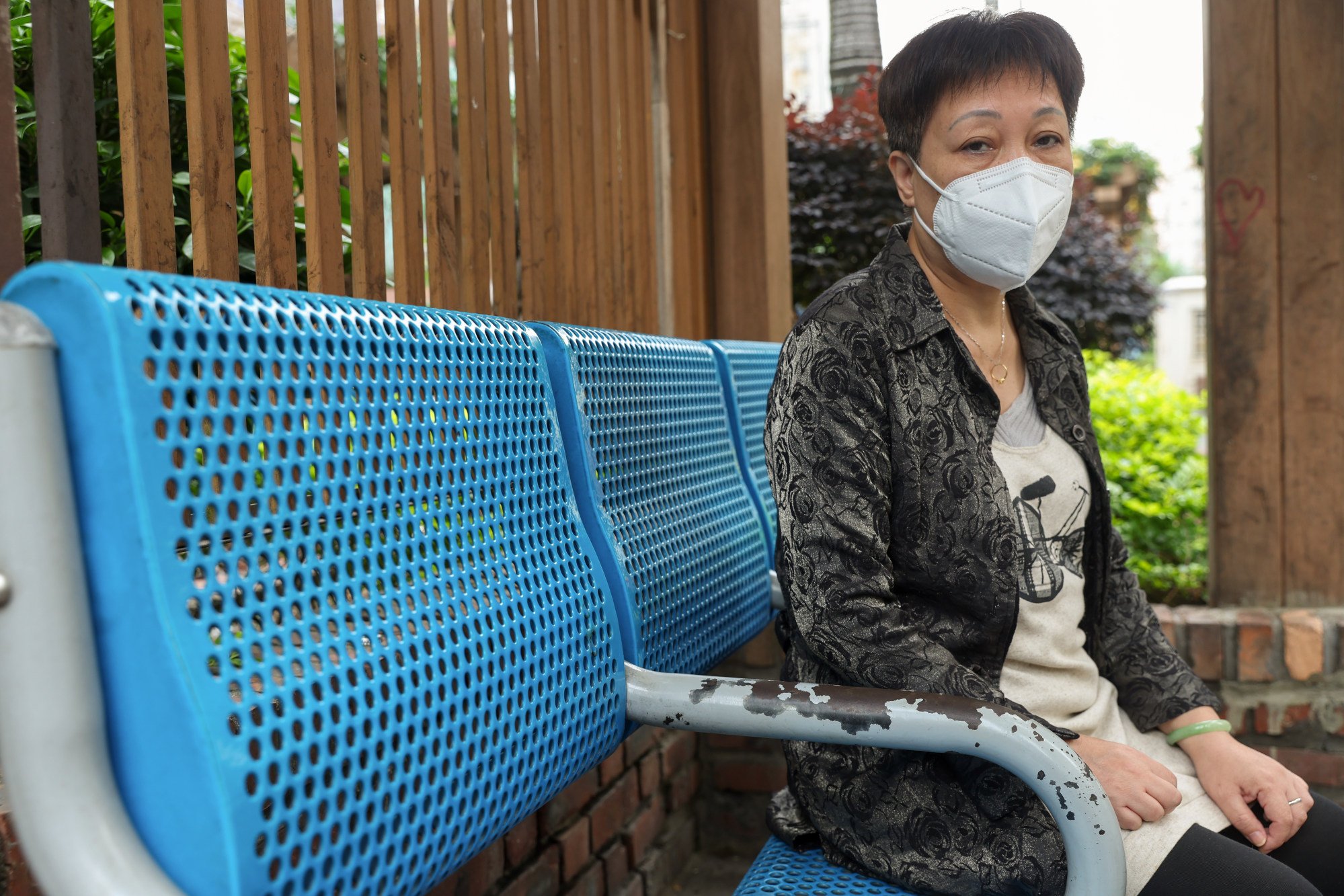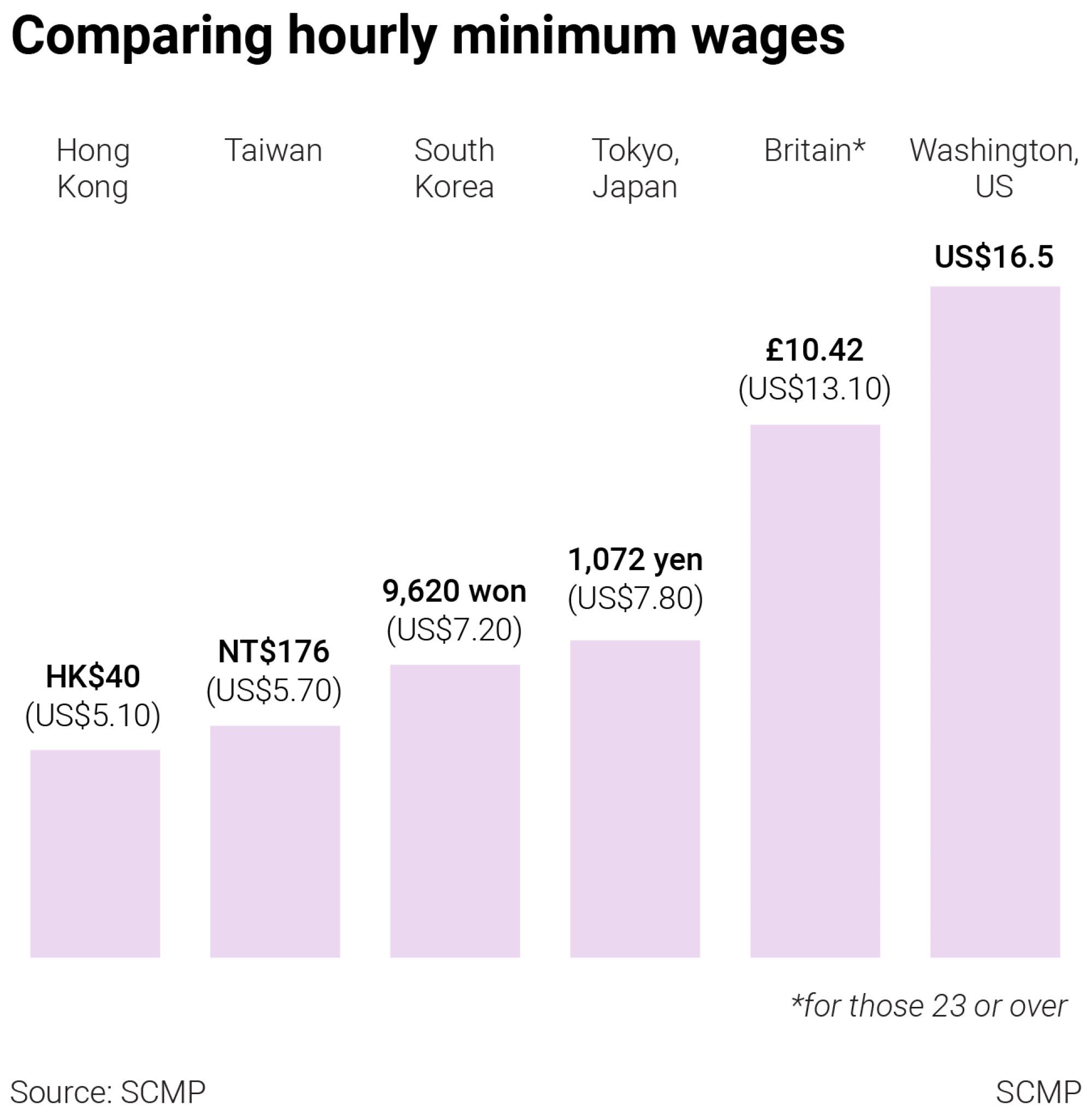
Hong Kong’s minimum wage goes up to HK$40 an hour but life’s still a struggle for poor residents. Can the city do better?
- HK$40 an hour is too little too late, some say, as the poor face rising costs of food, utilities
- A ‘living wage’, reviewed annually, will give workers a decent standard of living, advocates say
Ah Ling* will receive an extra HK$520 (US$66) in her income from this month as the caretaker of a residential block in Sham Shui Po, one of Hong Kong’s poorest areas.
Her pay will go up to HK$8,320 a month.
“Of course, it is better to have a higher wage,” she said. “But with food and utilities prices getting more expensive, things will still be very hard.”

The change and an ongoing review have not been without controversy, with some advocates for the poor saying the minimum wage scheme needed overhauling, while others representing employers and businesses urging restraint at a time when the city was facing a severe shortage of workers.
Hong Kong introduced the statutory minimum wage of HK$28 an hour in 2011 to provide protection for low-paid workers.
The commission, an independent statutory body with representatives from the labour sector, business community, academia and government, said that in reviewing the rate, it took into account factors such as the general economic and labour market conditions, the potential impact of an increase on employers and employees, and the views of the public and relevant stakeholders.
Its aim was to strike a balance between avoiding unduly low pay and the loss of jobs, and sustaining Hong Kong’s economic growth and competitiveness.
‘Life’s better in prison’: rising cost of living hits Hong Kong’s poor hard
Ah Ling’s husband is a part-time waiter and together, they earn about HK$11,000 a month. They live with their teenage daughter in a low-rental public flat in Shek Kip Mei Estate.
“After the rent and bills are covered, the only flexible expense left in the family budget is food – the amount and quality,” Ah Ling said. “Prices of groceries are exploding. We are really struggling to make ends meet.”
She has toiled in the caretaker’s corner on the ground floor of the block for four years. Working two four-hour shifts daily, she deals with cleaning, minor repairs and clerical work for the owners’ committee, besides monitoring the live pictures from the CCTV cameras.

“I have to be frugal. I usually buy food at the market around the evening when most stalls reduce prices to clear their stuff,” she said.
With her daughter in Form Four, she hopes to save money for the girl to have private tuition, which cost almost HK$300 for a 1½-hour session.
“The increase this time is too little and too late. I am not asking for the moon, but the government should ensure that the minimum wage reflects the living cost, and increase the rate more often,” she said.
She said she believed a more reasonable minimum wage would be at least HK$50 an hour.
How far can HK$40 go in Hong Kong? New hourly wage takes effect amid high living costs
At present, the highest rate is US$16.50 (HK$130) in Washington, followed by US$15.74 in Washington state.

Britain’s minimum wage, in place since 1999, has rates that vary by age groups, with those aged 23 and above receiving the highest rate of 10.42 pounds (HK$103) per hour.
“Ah Ling’s story is far from unique. For many low-paid workers in Hong Kong, their hard-earned money can no longer prevent them from sinking into poverty,” said Sze Lai-shan, deputy director of the Society for Community Organisation (SoCO), which serves the poor and underprivileged groups in the city.
She called for a reform of the current system, replacing the minimum wage with a “living wage”, an amount sufficient for a worker and his family to afford a decent standard of living. She said it should be reviewed every year.

Responding to calls for reform, city leader John Lee Ka-chiu tasked the Minimum Wage Commission to look at how often the rate should be reviewed and the factors to be considered, among others.
The first stage of a four-week consultation ended on April 24, with a second stage to follow before the commission is expected to submit a report in October.
The exercise reignited a fresh round of debate. Opponents of the minimum wage, mainly the business sector, argued that increased labour costs would overwhelm small businesses financially.
Some said the lingering labour crunch had already pushed up wages for low-skilled jobs, making a review of the system redundant.
Unions and advocates of the minimum wage however said paying workers more could stimulate the economy by increasing spending power and also help ease poverty and income inequality.
Cap starting rent for subdivided flats, Hong Kong concern group and lawmaker say
Sze cited the government’s poverty figures and argued that the increase in the number of “working-poor” households over the years was proof that the current minimum wage system was not working.
A working-poor household is one whose monthly income is less than half the median monthly income of households of the same size with at least one member working.
The number of such households rose from 199,000 in 2011 to 238,200 in 2020, according to the government’s Commission on Poverty, of which Sze is a member. The poverty rate among such households grew from 11.7 per cent to 13.6 per cent over the period.
“This shows that the wages of local workers are far too low and partly result in the worsening of Hong Kong’s poverty problem,” Sze said. “A low wage level could also contribute to cross-generational poverty.”
Some Hong Kong bosses ‘taking advantage of older workers over leave, sick pay’
Agreeing, Federation of Trade Unions lawmaker Dennis Leung Tsz-wing said: “It is out of touch with reality that the government only increased the minimum wage by HK$12 in the past 12 years. This cannot catch up with inflation and hurts the working class’ purchasing power.”
His federation also supported having a living wage, with the amount set no lower than 60 per cent of the median hourly wage of all Hong Kong employees, which stood at about HK$77.40 as at the end of last December (2022).
That formula would mean a living wage no lower than HK$46.50 per hour.
Recent research by SoCO found that a worker earning the new minimum wage of HK$40 per hour and working 192 hours a month would have a monthly income that was only 38.4 per cent of the monthly median wage of HK$20,000 of all employees in the city.
This compared poorly with the situation in 2011 when the minimum wage was HK$28. Then, a worker on the minimum wage earned the equivalent of 44.8 per cent of the monthly median wage of all employees, which was HK$12,000.
The hourly minimum wage in Taiwan is set at NT$176, while in South Korea the rate is fixed at 9,620 won.
According to an ILO report last year, the minimum wage level in developed countries was on average about 55 per cent of the median wage. It was about 67 per cent in developing economies.

Economist Simon Lee Siu-po, an honorary fellow at the Asia-Pacific Institute of Business at Chinese University, also supported adopting a living wage.
“Minimum wages do not always reflect the cost of living,” he said. “Different people of course have different living styles and the costs of living will be different, but it should not be too unreasonable for a worker to expect the hourly wage he gets is enough for him to buy a meal.
“The minimum pay for working an hour – even at HK$40 – is not enough to buy an average lunch at a local restaurant.”
Lee said he believed that higher pay would give employees greater incentive to work hard. “The productivity of workers will be higher if they are happier,” he said.
But economist Lee Shu-kam, head of Hong Kong Shue Yan University’s economics and finance department, argued it was unfair to ask employers to bear the burden of their workers’ living standards, or help address the social issue of poverty.
“There is no denying that some lower-paid workers in Hong Kong are living a difficult life. But it is debatable whether an employer has the responsibility to ensure the wages paid to their employees will be enough to support their living,” he said.
Why is Hong Kong’s inflation so low compared with other global cities?
“We should not presume that all employers are fat cat bosses. Most of Hong Kong’s businesses are small and medium-sized enterprises. If workers must be guaranteed enough pay to support a decent living, should the bosses also be allowed a guaranteed profit level?”
Lee warned that the situation could result in spiralling wages and inflation.
“Prices of services and products will inevitably increase as a result of higher labour costs. When things get more expensive, workers will in turn ask for higher wages and that, in turn, will push up prices further,” said Dr Lee.
Higher production costs could also harm Hong Kong’s competitiveness, he added.
Simon Wong Ka-wo, vice-president of the Chinese Manufacturers’ Association of Hong Kong, was more radical, saying the minimum wage system should just be scrapped.
“We are now suffering a labour shortage and many employers cannot recruit enough people even if they are willing to pay much more than the minimum wage. There is no point debating whether the minimum wage should be reviewed once every two years or not,” said Wong, who is also president of the Hong Kong Federation of Restaurants & Related Trades.
He preferred for wages to be determined by market forces and for more productive workers to be paid more.
“The minimum wage only raises controversies every time it is reviewed. It does no good to social harmony,” he said.

To avoid both workers and employers getting riled each time the minimum wage level was changed, legislator Frankie Ngan Man-yu, labour affairs spokesman at the Democratic Alliance for Betterment and Progress of Hong Kong, proposed pegging the rate at the 10th percentile of the hourly wage in low-paying sectors.
That refers to the hourly wage of the lowest-paid 10 per cent of workers in sectors such as retail, catering, estate management, security and cleaning.
“Not everyone working in low-paying sectors is low-paid. So if we look at the lowest paid 10 per cent, few would disagree that they should be the group that badly needs the support of a minimum wage,” said Ngan.
Using that formula, Hong Kong’s minimum wage should have been set at HK$40.50 an hour in 2019.
He also said the commission should simplify its deliberation process to allow a new rate to be set every year.
“The commission should focus on how to protect lower-income workers from unduly low pay. That is the core objective of adopting a minimum wage,” said Ngan, “Factors like the impact on Hong Kong’s economic growth and competitiveness should be irrelevant and no workers would bother to care.”
‘I’ll swallow my toothache’: Hong Kong’s dentist shortage leaves poor without care
Secretary for Labour and Welfare Chris Sun Yuk-han said in a Facebook post on Labour Day that the new minimum wage level could help improve the income of low-paid workers and was also conducive to Hong Kong’s overall interests and development.
Sun said the Minimum Wage Commission was expected to submit its review report to the government by the end of October.
“The government will give the report careful consideration and will announce a decision on the next move forward as early as possible,” he said.
* Name changed at interviewee’s request.

